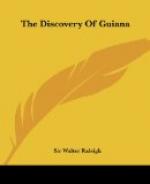TO THE READER
Because there have been divers opinions conceived of the gold ore brought from Guiana, and for that an alderman of London and an officer of her Majesty’s mint hath given out that the same is of no price, I have thought good by the addition of these lines to give answer as well to the said malicious slander as to other objections. It is true that while we abode at the island of Trinidad I was informed by an Indian that not far from the port where we anchored there were found certain mineral stones which they esteemed to be gold, and were thereunto persuaded the rather for that they had seen both English and Frenchmen gather and embark some quantities thereof. Upon this likelihood I sent forty men, and gave order that each one should bring a stone of that mine, to make trial of the goodness; which being performed, I assured them at their return that the same was marcasite, and of no riches or value. Notwithstanding, divers, trusting more to their own sense than to my opinion, kept of the said marcasite, and have tried thereof since my return, in divers places. In Guiana itself I never saw marcasite; but all the rocks, mountains, all stones in the plains, woods, and by the rivers’ sides, are in effect thorough-shining, and appear marvellous rich; which, being tried to be no marcasite, are the true signs of rich minerals, but are no other than El madre del oro, as the Spaniards term them, which is the mother of gold, or, as it is said by others, the scum of gold. Of divers sorts of these many of my company brought also into England, every one taking the fairest for the best, which is not general. For mine own part, I did not countermand any man’s desire or opinion, and I could have afforded them little if I should have denied them the pleasing of their own fancies therein; but I was resolved that gold must be found either in grains, separate from the stone, as it is in most of the rivers in Guiana, or else in a kind of hard stone, which we call the white spar, of which I saw divers hills, and in sundry places, but had neither time nor men, nor instruments fit for labour. Near unto one of the rivers I




